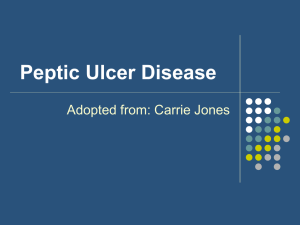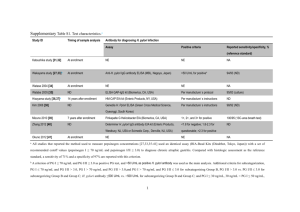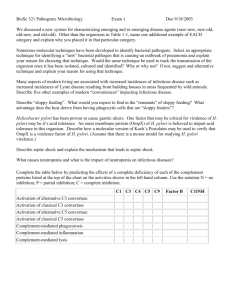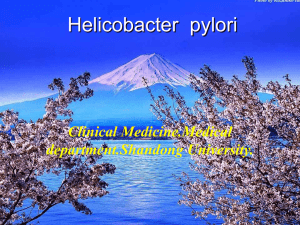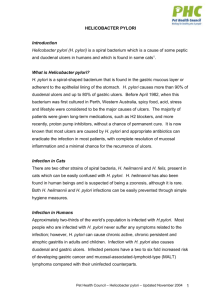an H. pylori guide for your patients
advertisement
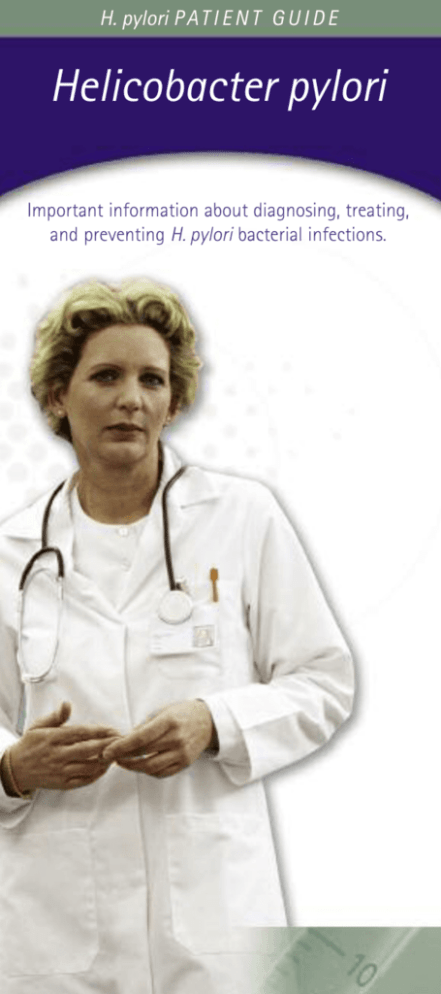
H. pylori P A T I E N T G U I D E Helicobacter pylori Important information about diagnosing, treating, and preventing H. pylori bacterial infections. What is H. pylori? . . . . . . . . . . . . . . . . . . . . . . . . . . . . . . . . . . . . . . . . . . . . . . . . 1 What is an ulcer? . . . . . . . . . . . . . . . . . . . . . . . . . . . . . . . . . . . . . . . . . . . . . . . . . 1 What are the symptoms of ulcers? . . . . . . . . . . . . . . . . . . . . . . . . . . . . . . . . 2 What is dyspepsia? . . . . . . . . . . . . . . . . . . . . . . . . . . . . . . . . . . . . . . . . . . . . . . . 2 What other illnesses does H. pylori cause? . . . . . . . . . . . . . . . . . . . . . . . . . 2 How common is H. pylori infection? . . . . . . . . . . . . . . . . . . . . . . . . . . . . . . . 3 Who should be tested and treated for H. pylori ? . . . . . . . . . . . . . . . . . . . 4 How can your doctor tell if you have H. pylori? . . . . . . . . . . . . . . . . . . . . . 4 What are the treatment options if you have H. pylori infection? . . . . . 5 When is it necessary to be retested after treatment for H. pylori infection?. . . . . . . . . . . . . . . . . . . . . . . . . . . . . . . . . . . . . . . . . . . . 5 Are there any long-term consequences of H. pylori infection?. . . . . . . . 6 WHAT IS H. PYLORI? Helicobacter pylori (H. pylori) is a spiral-shaped bacterium that is found in the lining of the stomach. Although we used to think that spicy food, acid, and stress were the major causes of ulcers, we now know that eight out of ten ulcers are caused by the H. pylori bacteria. WHAT IS AN ULCER? An ulcer is a sore or hole in the lining of the stomach or duodenum (the first part of the small intestine). Twenty-five million Americans suffer from ulcers1, and people of any age can get an ulcer. Additionally, women are just as likely as men to get an ulcer. 1 WHAT ARE THE SYMPTOMS OF ULCERS? Each year there are 500,000 to 850,000 new cases of ulcers (peptic ulcer disease) and more than one million ulcer-related hospitalizations.1 The most common ulcer symptom is gnawing or burning pain in the stomach. This pain typically occurs when the stomach is empty, between meals and in the early morning hours, but it can also occur at other times. It may last from minutes to hours and may be relieved by eating or by taking antacids. Less common ulcer symptoms include nausea, vomiting, and loss of appetite. Bleeding can also occur; prolonged bleeding may cause anemia leading to weakness, fatigue, and death. WHAT IS DYSPEPSIA? Dyspepsia is the medical term that is used to describe what many people refer to as stomach pain or abdominal pain centered in the upper abdomen. If you have stomach pain, it may be caused by an H. pylori infection. Additionally, different types of pain in different areas of the stomach can mean different things, so if you have stomach pain, it is important to discuss the pain or discomfort with your doctor. WHAT OTHER ILLNESSES DOES H. PYLORI CAUSE? 2 Most persons who are infected with H. pylori never suffer any symptoms related to the infection; however, in addition to causing up to 80% of stomach ulcers, H. pylori is also a class-1 carcinogen. Infected persons have a 2 to 6-fold increased risk of developing gastric cancer and mucosal-associated-lymphoid-type (MALT) lymphoma compared with their uninfected counterparts. 2 HOW COMMON IS H. PYLORI INFECTION? H. pylori is believed to infect approximately two-thirds of the world's population and approximately one-third of the population of the United States. There are segments of the U.S. population that have much higher prevalence rates as compared to the general population. Prevalence rates can vary according to ethnic background, socioeconomic status, and age. Developing countries have much higher prevalence rates than developed countries. In the U.S., the African-American and Hispanic subpopulation groups show prevalence rates similar to that of developing countries, and immigrants from Asia, Eastern Europe, and Africa have prevalence rates similar to that of the African-American and Hispanic populations. WORLDWIDE PREVALENCE OF H. PYLORI IN THE MID-1990s2 United States and Canada . . . . . . . . . . . . . . . . . . . . . . . . . 30%-40% Mexico and Central/South America . . . . . . . . . . . . . . . . . 70%-90% Western Europe . . . . . . . . . . . . . . . . . . . . . . . . . . . . . . . . . . 30%-50% Eastern Europe . . . . . . . . . . . . . . . . . . . . . . . . . . . . . . . . . . . . . . . 70% Africa . . . . . . . . . . . . . . . . . . . . . . . . . . . . . . . . . . . . . . . . . . . 70%-90% Asia . . . . . . . . . . . . . . . . . . . . . . . . . . . . . . . . . . . . . . . . . . . . 70%-80% Australia . . . . . . . . . . . . . . . . . . . . . . . . . . . . . . . . . . . . . . . . . . . . . 20% 3 WHO SHOULD BE TESTED AND TREATED FOR H. PYLORI? 3 The AGA (American Gastroenterological Association) recommends that all patients who have dyspepsia (stomach pain), who do not have alarm symptoms, have not been using abnormally high amounts of anti-inflammatory drugs like ibuprofen, and who are less than 55 years of age, should be tested for H. pylori prior to taking any drug treatments. Additionally, persons with active stomach or duodenal ulcers or documented history of ulcers should be tested for H. pylori, and if found to be infected, they should be treated. HOW CAN YOUR DOCTOR TELL IF YOU HAVE H. PYLORI? Your doctor may choose to use any of the following tests to determine if your ulcer is caused by H. pylori: Stool test: A simple stool test can determine if you are infected with H. pylori. In this test, which is FDA approved for both children and adults, you provide your doctor with a small stool specimen (an easy-to-use collection system is provided for this purpose). The doctor will conduct the test in his office or send it to a laboratory. Breath test: A breath test can determine if you are infected with H. pylori. In this test, you drink a liquid that contains phenylalanine and in less than 1 hour, a sample of your breath is collected and is tested for H. pylori either in the office or at an off-site laboratory. The patient is required to be off of antibiotic medication and bismuth preparations like Pepto-Bismal for 2 weeks prior to the test. Endoscopy: Your health care provider may decide to perform an endoscopy. This is a test in which a small tube with a camera inside is inserted through the mouth and into the stomach to look for ulcers. During the endoscopy, small samples of the stomach lining can be obtained and tested for H. pylori. 4 Serology (Blood) Test: There is also a blood test for H. pylori, however this test is extremely inaccurate and is not recommended to be used by your health care provider to test for H. pylori. The American Gastroenterological Association and the American College of Gastroenterology no longer recommend the serology test and actually recommend using one of the other abovementioned tests which test for active H. pylori infection. WHAT ARE THE TREATMENT OPTIONS IF YOU HAVE H. PYLORI INFECTION? If you have an ulcer, you should be tested for H. pylori, and if found to be infected, you should be treated with antibiotics. Antibiotics offer a new cure for ulcers; therapy is 1-2 weeks of two antibiotics plus a medicine that will reduce the acid in the stomach. This treatment is a dramatic medical advance because eliminating H. pylori with antibiotics means that there is a greater than 90% chance that the ulcer can be cured for good. Remember, it is very important to continue taking all of this medicine until it is gone, even when you begin to feel better. If you are having side effects that make it hard to take your medicine, talk to your health care provider. WHEN IS IT NECESSARY TO BE RETESTED AFTER TREATMENT FOR H. PYLORI INFECTION? According to the ACG, the accepted indications for testing to prove eradication after antibiotic therapy include, • Any patient with an H. pylori associated ulcer. • Individuals with persistent dyspeptic symptoms despite the test and treat strategy. • Those with H. pylori associated MALT Lymphoma. • Individuals who have undergone early resection of gastric cancer. 5 ARE THERE ANY LONG-TERM CONSEQUENCES OF H. PYLORI INFECTION? Recent studies have shown an association between long-term infection with H. pylori and the development of gastric cancer. In 1994 the World Health Organization declared that infection with H. pylori is carcinogenic to humans. Gastric cancer is the second most common cancer worldwide; it is most common in countries such as Colombia and China, where H. pylori infects over half the population in early childhood. In the United States, where H. pylori is less common in young people, gastric cancer rates have decreased since the 1930s. A.D.A.M. Health Center. Peptic Ulcers. Available at: http://adam.about.com/reports/000019_4.htm. Fennerty B. Helicobacter pylori : Why it still matters in 2005. Cleve Clin J Med 2005;72(2 Suppl):S1-S7. AGA Medical Position Statement & Technical Review: Evaluation of Dyspepsia: Gastroenterology 2005, 129:1753-1780. 4 Chey WD, Wong BCY, et. al., American College of Gastroenterology Guideline on the Management of Helicobacter pylori Infection, Am J Gastroenterol, Aug 2007;102, page 1816. 1 2 3 6 For more information about H. pylori go to www.hpylorilearningcenter.com or call the H. pylori hotline at (888) 279-5674 MERIDIAN BIOSCIENCE, INC. Meridian Bioscience is a fully integrated life science company that manufactures, markets and distributes a broad range of innovative diagnostic test kits, purified reagents and related products and offers biopharmaceutical enabling technologies. Utilizing a variety of methods, these products provide accuracy, simplicity and speed in the early diagnosis and treatment of common medical conditions, such as gastrointestinal, viral, urinary and respiratory infections. Meridian diagnostic products are used outside of the human body and require little or no special equipment. USA/Corporate Office 3471 River Hills Drive, Cincinnati, Ohio 45244 Telephone: 513.271.3700 Customer Service: 1.800.543.1980 Technical Support: 1.800.343.3858 www.meridianbioscience.com Belgium / France / Italy / The Netherlands Rev 09/09

